Revitalization of the colonial and pre-colonial heritage of Rimac
Lima
Volunteer project: The neighborhood of Rimac, at the time of colonial Lima, used to be the part of the town where the Spanish nobles had their luxurious residences. That changed with the time, and nowadays the hyped Miraflores and Barranco districts house the high and middle class of Lima, while Rimac has been deserted. The ancient colonial and pre-colonial heritage has been for long neglected, but now the municipality has decided to change this in collaboration with volunteers.
The project for valorization and conservation of the historical center of Rimac is part of the World Heritage Volunteering Initiative. The Municipality of Rimac welcomes volunteers willing to help in the process of rehabilitation of the district by re-purposing of the Backus factory, cleaning the Huaca la Florida archeological site and mobilization of the community around Trujillo street. The project also aims to sensitize the population of the district to the importance of the cultural heritage conservation through adaptive reuse of historical sites in the city center.
The volunteers, under the supervision of a technical leader, will clean, paint and furnish the last floor of the ancient Backus factory, in order to allow the Rimac social center to use it for cultural and educational activities.
The group will clean the Huaca la Florida archeological site, in order to open the ancient temple ruins to the public. They will also organize an activity to raise awareness on the importance of the site, targeting the local population.
Supported by a local association, the volunteers will organize a street event in order to requalify the urban space of Jiron Trujillo, an ancient street with high tourist potential, by involving the local residents.
The participants will also prepare and implement some presentations in the Rimac schools aiming to sensitize the students to the importance of local heritage and its preservation and valorization.
Language: English
Leisure time: You have all the leisure activities of a big and modern capital at your disposal: museums, archeological sites, bars, restaurants, clubs, and even the possibility to surf on the waves of the Pacific Ocean! From Lima you can easily organize excursions to visit all the most beautiful sites of Perú, like Machu Pichu, the Titicaca lake, the White Cordillera, etc.
Accommodation: The volunteers will be accommodated in the historic center of Lima. The facility offers basic services including laundry. The participants will sleep in shared rooms and will have to bring their own sleeping bag.
Location: Rimac district is located in the northern part of Lima, the capital of Perú and ancient capital of the colonial dominions of Spain in the Andean region. Rimac district is nowadays mainly inhabited by lower-class residents. Just crossing the Rimac river, you are in the very historical center of town. You can breathe the atmosphere of colonial Lima just walking in its ancient streets, lined with beautiful “casona”, the houses of the Spanish nobles.
Terminal: Jorge Chavez International Airport, Lima
Age range: 18 and over
Extra fee: 250 USD
The extra fee is intended to support the local host of the project who does not have sufficient funds. It is due upon arrival.
Renovating a kindergarten in Ayacucho
Ayacucho
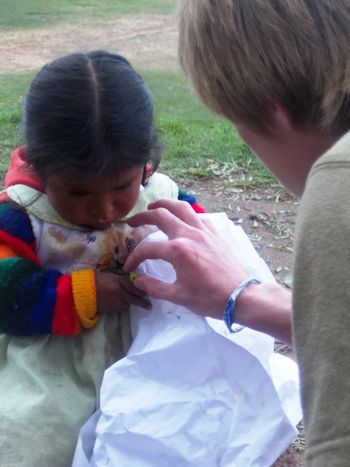 Volunteer project: The non-school early childhood education programs in Peru were created to offer an alternative care to children who do not have access to formal education, recognizing the importance of the educational role of the community in marginal rural and urban areas. They represent an action of social assistance by the communities to support children and their mothers, as a form of protection and attention to their basic needs. The program currently covers children from 3 to 5 years of age of marginal urban and rural areas throughout the country. Each mother of the community covers a shift to guard the children in order to ensure a self-managed nursery.
Volunteer project: The non-school early childhood education programs in Peru were created to offer an alternative care to children who do not have access to formal education, recognizing the importance of the educational role of the community in marginal rural and urban areas. They represent an action of social assistance by the communities to support children and their mothers, as a form of protection and attention to their basic needs. The program currently covers children from 3 to 5 years of age of marginal urban and rural areas throughout the country. Each mother of the community covers a shift to guard the children in order to ensure a self-managed nursery.
The volunteer project in Ayacucho will support the community in the renovation and maintenance of one such kindergarten in the district of Quinua. The volunteers will help with:
- Cleaning and maintenance of the classrooms
- Painting the walls of the kindergarten
- Creating happy and creative murals
- Repainting and repairing playground equipment
- Playing with the children
Language: English
Accommodation: The volunteers will be accommodated in a house, 40 minutes from Ayacucho. The building will be provided with laundry. The participants will share rooms and will have to bring their own sleeping bag.
Location: Ayacucho is situated at an altitude of 2,746 m. It is characterized by its pleasant climate, temperate and dry. It is one of the most remarkable architectural and artistic ensembles in the country. Known as the «City of Churches» and «City of Majesty», Ayacucho has more than 30 churches and colonial temples of Renaissance, baroque and mestizo style, which keep in their interior real works of art such as paintings, images and beautiful altarpieces carved in wood and bathed in gold leaf.
Ayacucho is also renowned at international level for its artistic manifestations, reason for which it was declared as "Capital of Popular Art and Crafts of Peru".
One of its touristic attractions is the Archaeological Complex of Wari, one of the most extensive legacies of Peru. The complex, ancient capital of the pre-Inca empire of the Wari people, covers an area of 2,200 hectares, where you will discover entire neighborhoods built of stone and mud.
Another site of interest is the independence mausoleum, built on the battlefield where the Independents army lead by the Mariscal José de Sucre vanquished the Spanish Virrey obtaining the independence of South America from the colonial power.
Quinua Village is an ideal place for practicing experiential tourism. The people of Quinua still respect and follow their traditions. In the town center you can visit an archeological museum presenting some Wari items. The people of Quinua will also offer visitors their beautiful ceramic works, as an attraction that will allow the traveler to take part of Quinua with them.
Terminal: Coronel FAP Alfredo Mendívil Duarte Airport or Ayacucho Yanamilla Airport (AYP), Ayacucho
Age range: 18 and over
Extra fee: 250 USD
The extra fee is intended to support the local host of the project who does not have sufficient funds. It is due upon arrival.
Heritage restoration and training program in Cajamarca
Cajamarca
Volunteer project: The city of Cajamarca is very attached to its historical and cultural heritage. For this reason this year the municipality launched an ambitious plan for conservation and rehabilitation of the historic center. The project aims to collaborate in this process under the flag of the World Heritage Volunteers initiative.
The main goal is to work on the renovation of the house of Toribio Casanova, the illustrious founder of the city, in order to transform it into a museum of the culture and identity of Cajamarca, a center for promotion of the history and heritage of the town. The idea is to develop a multidimensional approach, combining manual work, awareness raising actions, cultural exchanges, developing competences in the renovation crafts and touristic valorization. Local people and associations are happy to welcome international volunteers willing to help in the restoration of this beautiful cultural and historical heritage. The objective of the volunteer project is to support the renovation of the ancient Casona of Toribio Casanova and to increase public awareness of heritage conservation.
The volunteers, under the supervision of a technical leader, will participate in all the necessary works for restoration of the house of Toribio Casanova: cleaning, renovation of the walls, construction, carpentry and reproduction of the original decorations.
In the afternoons, participants will take part in classes offered by the Restoration Workshop School of the municipality of Cajamarca to learn the art of restoration: stone cutting, carpentry, blacksmithing, archaeological conservation and gardening.
The volunteers will carry out awareness raising activities on heritage conservation based on non-formal education tools in educational centers and schools. They will also organize animation activities and parades to inform the community about the work done. The project will end with the organization of a fair to show the results of the volunteers' work to the city residents.
Language: English
Leisure time: Cajamarca offers several archaeological and natural tourist attractions, like the Cerro Santa Apolonia, a viewpoint dominating the town where you can sit on the ancient “Inca chair”, a recreational center with thermal waters (where the Inca Atahualpa bathed) and also the Ransom Room that was filled once with gold and twice with silver to pay the freedom of Atahualpa, in vain. Just 45 minutes from the city of Cajamarca are the Chetilla and Porcon communities that still maintain the original language of Quechua and their ancestral customs such as bartering, minga, etc. You can also discover pre-Inca ceremonial centers like Cumbe Mayo, where you can see ancient hydraulic system and a unique engineering still working nowadays, cave paintings, a stone forest and a museum site. It is also possible to trek on the Inca Trail, visit Llacanora Falls, and bathe in one of the largest lagoons in the north, Laguna de San Nicolás.
Accommodation: The volunteers will be accommodated in the historic center of Cajamarca. The facility offers basic services including laundry. The participants will sleep in shared rooms and will have to bring their own sleeping bag.
Location: Cajamarca is an important cultural and commercial center in the northern Andes. It is located in the northern highlands of Peru at approximately 2,750 m (8,900 ft) above sea level.
Terminal: Aeropuerto Mayor General FAP Armando Revoredo Iglesias (CJA), Cajamarca
Age range: 18 and over
Extra fee: 250 USD
The extra fee is intended to support the local host of the project who does not have sufficient funds. It is due upon arrival.
Support local sustainable development and income generating activities in Palca
Palca
Volunteer project: This project was launched a year ago in order to create a local production center in the community of Huaruyoc and to improve the living conditions of the community members. The objective of this center is to generate an economic income for the community, working at the same time in an inclusive manner in order to involve the poorest part of the population, and using organic products from the area in order to promote local development that respects the environment.
In particular, the center works on
1. Eco-craftsmanship: compilation, transformation and production;
2. Agroindustry: collection, selection and transformation;
3. Eco-tourism: valorisation, inventory.
The production center has been very successful and is well recognized in the local production landscape. The next step is the creation of a place of sale for the products of the center. We want this store to have a social dimension as well, serving as a meeting place for locals and travelers, raising awareness of local problems and fostering ecotourism development. The volunteers in this project will help set up an organic store to sell the goods produced by the center and will participate in the center's production activities.
The volunteers will carry out various activities, not only the organization and decoration of the store, but they will also take part in workshops about ecotourism and cultural exchange. The project tasks include:
• Preparation of a mural for the store in order to show the cultural identity of the area.
• Construction of high relief tablets in mud as a tourist attraction.
• Work with children in the creation of a Bio-garden aiming to improve the food supply.
• Participation in production and handicraft workshops in order to promote economic improvement for the people in the area.
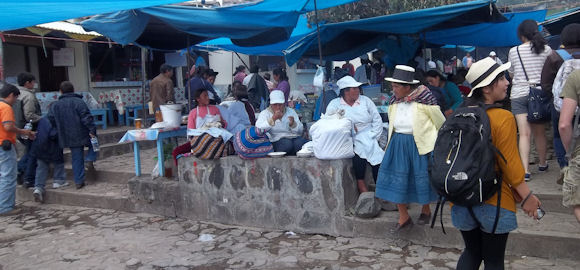
Language: English
Leisure time: In the free time, volunteers will participate in walks, sports, cultural exchange activities. Some possible excursions are the Grotto of Huagapo "The deepest grotto of South America", the pre-Inca salt pans (Cachipozo) and the Perené Valley.
Accommodation: The participants will be accommodated in the district of Palca, one of the nine districts of the province of Tarma, located 30 minutes from the provincial capital. The accommodation will be in a family house with four rooms. The volunteers will sleep in shared rooms (bring your own sleeping bag). The host family has more than 7 years of experience with visitors from other countries.
Location: Palca is a thriving town where 90% of its inhabitants are dedicated to agriculture and the remaining 10% to trade and livestock. It owns several tourist routes like the lagoons of Yuracmayo, the ruins of Maraynioc, the recreational center of Yaroca, etc. The food is varied, based on Creole cuisine. During the project, the national festivities will be held (July 28 and 29), and the anniversary of the saint patron of the district of Palca, Santo Domingo de Guzmán, will be celebrated on the first week of August. The district of Palca has a temperate climate, with moderate rainfall and sunny and hot days from May to November. The community of Huaruyoc is 10 minutes from Palca.
Terminal: Tarma bus terminal
Age range: 18 and over
Extra fee: 250 USD
The extra fee is intended to support the local host of the project who does not have sufficient funds. It is due upon arrival.
Installing organic gardens and raising environmental awareness
Aguaytia
Volunteer project: Volunteers in this project will help reinforce the activities of the Center for Integral Family Development, a unit of the National Integral Program for Family Wellbeing, where children, adolescents and seniors are assisted. The social work done by this structure, even if little known by the population, is very important for the community. These centers provide specialized services aimed at strengthening families, promotion of respectful and caring family relationships and integral development of its members.
The project aims to work with children and adults, who are a fundamental link of the integral development of our society. We hope to strengthen food security and care of the environment through the installation of organic gardens, which is an efficient and sustainable alternative to protect the environment and generate our own food supplies without using synthetic chemicals to control pests or fertilize the land, as well as avoiding the use of plastic bags used for packaging. Also, through this activity, children are taught the importance of environmental care and how to grow food in urban spaces.
The organic agricultural approach that is used in this project is bio gardening. Its agroecological production does not harm the soil or the environment, on the contrary it assures the long term productivity of the soil, fixing nutrients and absorbing only what is necessary. The control of pests and diseases is assured in a biological way that allows achieving a natural balance in the environment, without producing toxicity or totally eliminating species. Feeding of people is improved with the consumption of fresh and healthy vegetables.
We welcome international volunteers to be part of this program and participate in the installation of bio-gardens and environmental care and awareness activities through the organization of workshops.
The city of Aguaytia has been blessed with productive soils, so in this project the volunteers will install small organic gardens in the center. This activity will involve children, seniors and the volunteers who will be provided with seeds and compost in order to grow all types of vegetables, aromatic and medicinal herbs. You will install 3 biogardens (3 meters by 10 meters in size). The vegetables that will be planted are tomato, caigua, cabbage, spices, peppers, aromatic and medicinal plants, and fruits like banana, annona, pineapple, zapote, caimito and guaba.
The volunteers will also organize environmental workshops and learning sessions in order to raise awareness among local people. The activities will be carried out with the center staff and the volunteers will be supported in developing dynamic activities for children. These will include theater activities related to the topics of care and respect for the environment. At the end of this project, the talks and the plays will be presented through radio, television and other local media, to raise awareness about environmental protection.
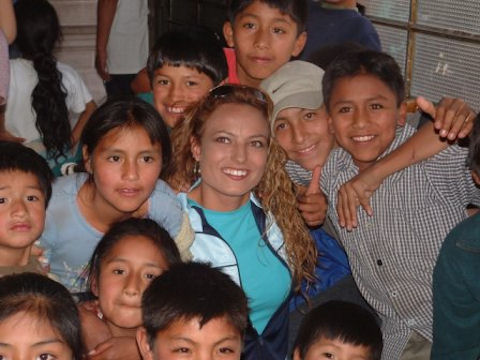
Language: English
Accommodation: The project will take place in the City of Aguaytía. You will be accommodated in family houses where you can experience the local way of living, as one of the family. You can share regional foods and exchange experiences. The family homes provide a shared room with bed and mattress. Bring your sleeping bag.
We remind you that Aguaytia is located in the jungle and therefore it is normal to find insects in the field or in other environments. Please, inform us if you are allergic to any insects or food in advance.
Location: Aguaytía is a city that has beautiful natural landscapes at dawn and dusk, natural tourist resources such as waterfalls and rivers with clean and fresh waters, very friendly people who live in harmony with a beautiful nature. The main economic activities are the production of cacao, banana and coffee.
Terminal: FAP Captain David Abensur Rengifo International Airport (PCL), Pucallpa
Age range: 18 and over
Extra fee: 250 USD
The extra fee is intended to support the local host of the project who does not have sufficient funds. It is due upon arrival.
Building Trombe walls for poor homes in the high Andes
Chucuito
Volunteer project: Every year during the low-temperature season, the population of several departments of the High Andean zones suffer the negative effects and damages caused by the cold weather. This affects mainly the more vulnerable groups of the population, both because of their social position (poverty and extreme poverty) and because of their age (young people, seniors, etc.). In order to counter this situation, they need viable actions not only of preparation and response, but also the inclusion of sustainable prevention and risk reduction measures in order to face the natural elements.
We started a project that has been already tested in other areas and that benefits families in extreme poverty affected every year by frost and cold. We are committed to improving the situation of the local community of Chucuito by building Trombe walls to increase the temperature of homes in a vulnerable state. The aim is to design, propose and implement the use of the Trombe walls in rural homes and this way to achieve thermal comfort in order to improve the quality of life of the people in the district of Chucuito in Puno Province.
The volunteers will work with local staff on the implementation of the Trombe walls. During the first week, the volunteers will learn the Trombe technique on a test house. During the rest of the project, they’ll split in groups in order to reproduce it on three other houses.
In the morning, the volunteers will go to the beneficiary house and work as a team to carry out the construction of the Trombe wall:
1) preparation of the foundations of the wall;
2) realization of air conducts and painting the wall;
3) construction of wooden structures;
4) positioning of greenhouse covers.
In the afternoon, the volunteers will be meeting the local people and sharing their customs and culture through intercultural activities.
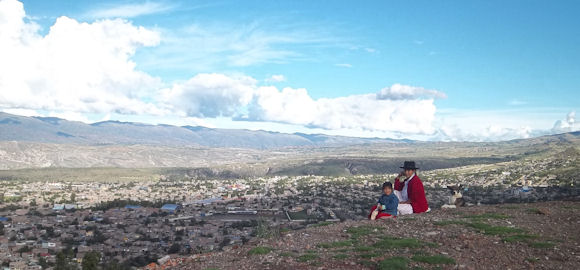
Language: English
Leisure time: The Independence of Peru is celebrated on July 28 with an artisanal and folkloric fair in which all the artisans show their products, accompanied by a great variety of food and music from the area. Also, the local people are looking forward to the celebration of the “Wajcha”, celebrated every 15th of August, which starts the agricultural year. During the project, you can visit the main attractions of the department of Puno like the floating islands of the Uros and the Chullpas of Sillustani that are one to two hours away from the district of Chucuito.
Accommodation: The group will be accommodated in a house in the district of Chucuito, half an hour away from the city of Puno. The volunteers will sleep in shared rooms. Bring a sleeping bag.
Location: The district of Chucuito is located to the south of the Department of Puno, in the Eastern Andes at around 4000 meters above sea level and has a cold climate. The main economic activity is handicraft and tourism. It extends across a peninsula of the highest navigable lake in the world, the Titicaca lake. Some of the main tourist attractions are located in the city center: the Archaeological Center "Inca Uyo", the Mallku Kála Bell, Glorieta or Mirador, solar clock, stone pool, etc.; others are in the Peninsular Zone, like Karina, Arku Punku - Churo, Luquina Chico, etc.
Terminal: Inca Manco Cápac International Airport (JUL), Juliaca
Age range: 18 and over
Extra fee: 250 USD
The extra fee is intended to support the local host of the project who does not have sufficient funds. It is due upon arrival.
Environmental cleaning and conservation in the Cordillera Blanca
Huaraz
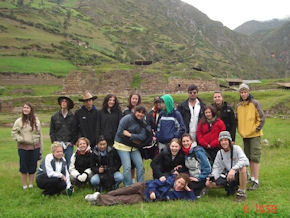 Volunteer project: In the last two centuries, humanity is accelerating the process of climate change through pollution. Today we must work for the conservation of our environment, starting with water. This can only be achieved by raising awareness and acting now for a good and sustainable future. This project will be carried out in partnership with the provincial municipality of Huaraz and the district municipality of Independencia of the department of Ancash.
Volunteer project: In the last two centuries, humanity is accelerating the process of climate change through pollution. Today we must work for the conservation of our environment, starting with water. This can only be achieved by raising awareness and acting now for a good and sustainable future. This project will be carried out in partnership with the provincial municipality of Huaraz and the district municipality of Independencia of the department of Ancash.
Volunteers are needed to help in the maintenance and care for the local ecosystem. We will work on two sites in particular:
• The Quillcay River, which used to have the purest and cleanest waters of the Cordillera Blanca, but unfortunately, due to the negligence of the community and the local authorities, is getting increasingly contaminated by solid wastes.
• La Quebrada Llaca, a beautiful cliff in a valley surrounded by glaciers, is suffering due to heavy touristic activities. In particular the wastes left by the tourists affect the flora and fauna of the Huascarán National Park.
The main aims of the project are:
• To protect the health of the people who drink the waters of Quillcay river and raise awareness among the community about the care and conservation of the Callejón valley environment.
• To conserve and protect the flora and fauna of the Quebrada Llaca in the Huascarán National park.
The volunteers will work together with local groups and staff in the following tasks:
• Cleaning and collecting solid waste from the river.
• Collecting garbage from the Quebrada Llaca mountain area.
• Recycling the collected waste.
• Carrying out workshops on environmental awareness in the afternoon, addressing the local community.
The cleaning of the Quebrada Llaca will be done during the last week of the project. During this time, the group will camp in the mountains and the volunteers will have the opportunity to try some ecotouristic activities like rock climbing, ice climbing, camping on the shores of Laguna de Llaca, and enjoying the beautiful landscapes that Huascarán National Park offers.
Language: English
Accommodation: The volunteers will be housed in the city of Huaraz. For the first 2 weeks, they will work along the Quillcay river, which is 10 minutes from the city center. The group will sleep in a building with shared rooms, a shower, a kitchen and a washing machine.
During the third week of the project, the group will camp in the Quebrada Llaca, 6 km from Huaraz. The volunteers will have to bring their own camping gear (tents, mats, sleeping bags, etc.)
Location: The city of Huaraz, Capital of the Ancash Region, International Capital of Friendship, and Capital of the Andean Community in South America is one of the most modern cities of the Andean Region of Peru, located in the heart of the Peruvian Andes, approximately 408 km north of Lima. Tourism is the main source of income. Visitors from all over the world come to Huaraz to climb the beautiful snow-capped mountains of the Cordillera Blanca, to discover the wonders that surround the thousand-year-old temple of Chavín and to enjoy the various tourist attractions, like trekking circuits (hiking), skiing, snowboarding, mountain biking, rafting, paragliding, rock and ice climbing, etc. Come to discover the wonders that this beautiful city contains! Huaraz and its hospitable people are looking forward to welcome you!
Terminal: Comandante FAP Germán Arias Graziani regional airport, Anta
Age range: 18 and over
Extra fee: 250 USD
The extra fee is intended to support the local host of the project who does not have sufficient funds. It is due upon arrival.
